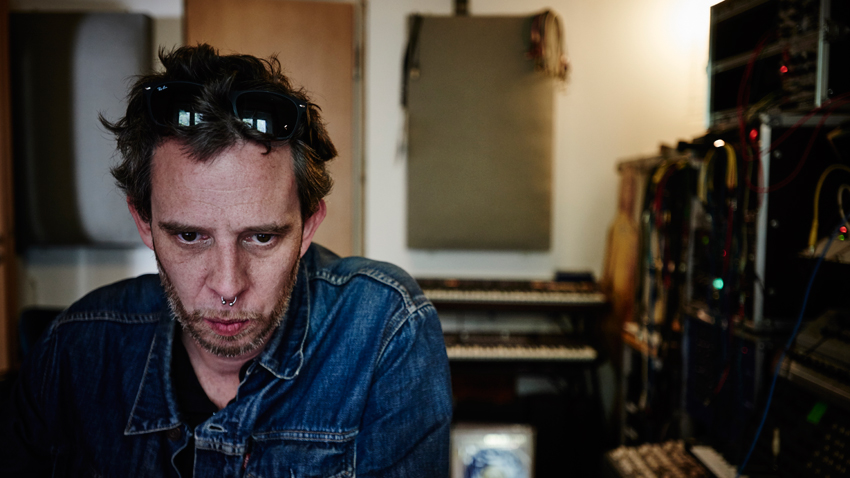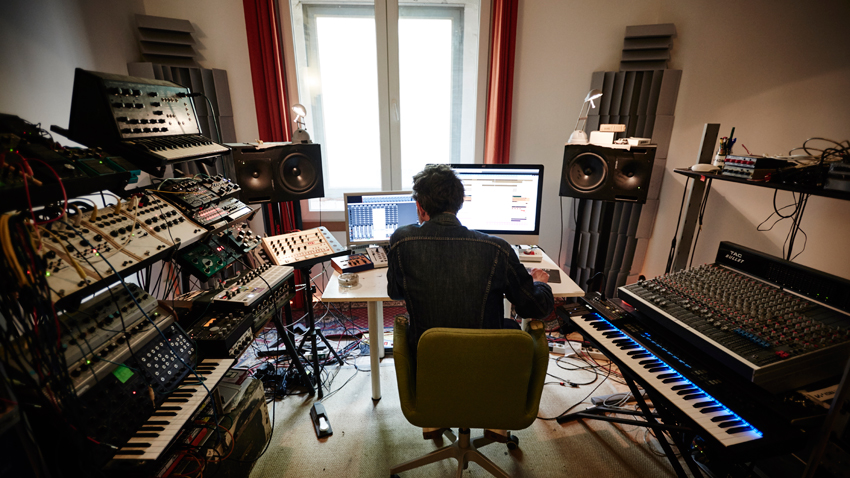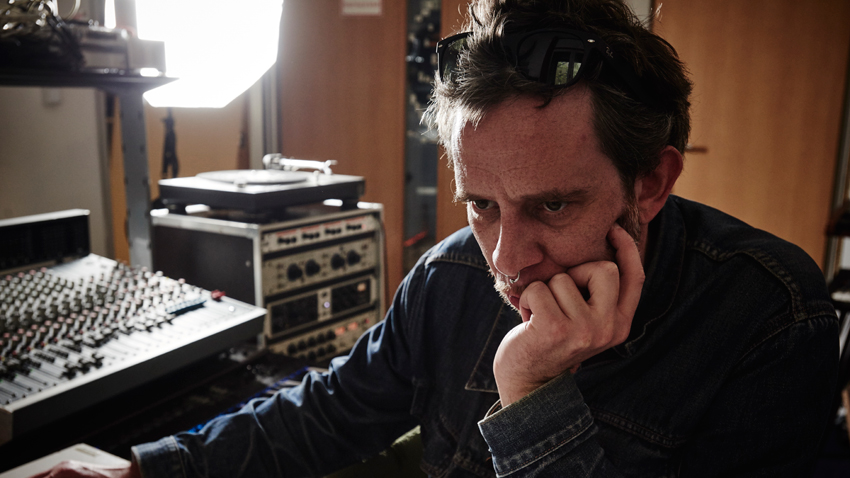T. Raumschmiere talks explorations in ambient and his new love of modular
Marco Haas has embraced the tranquil side of his personality with his latest T. Raumschmiere album, Heimat…

Want all the hottest music and gear news, reviews, deals, features and more, direct to your inbox? Sign up here.
You are now subscribed
Your newsletter sign-up was successful
With his background as a hardcore punk, Berlin-based Marco Haas has always been one to push, prod and provoke, whether drumming with his rock band Stormbow or utilising cold electronics for his gritty, industrial-sounding side project Shrubbn!!. Under the longstanding moniker T. Raumschmiere, Haas has been labelled King of Gnarz for his frenzied use of sampled loops.
With his intense stage antics and larger-than-life personality, Haas is driven by an incessant hunger to search out new means of self-expression and sound exploration, mostly released on his own Shitkatapult label. This year sees the infectious innovator tearing up the rule book again with his latest T. Raumschmiere release, Heimat, forging a conflicting yet emotive collision of pulsating beats and emotive ambiences.
Early on, you were a big fan of punk and heavy rock, so how did electronic music come into the equation when working on the first T. Raumschmiere releases?
“You’re right. I started my musical career as a drummer in a punk rock band. I was doing this up until early 2000, or even longer. At some point in the mid-90s, I just wanted to try some different styles and techniques, but my band colleagues were not into that. I decided to buy myself a drum computer and experiment on new things, but I also wanted to keep the punk spirit and combine those two elements.”
What model drum computer did you buy?
“It was a Roland MC-303. First I had to get familiar with the sounds and all its possibilities, because I’d never used one before. Pretty soon, I found out how things worked and bought an Akai MPC2000; then a whole new level opened up for me because I could sample my own sounds and go one step further with another sound aesthetic.”
Having been a drummer for so long, did it seem unnatural to start programming drums?
Want all the hottest music and gear news, reviews, deals, features and more, direct to your inbox? Sign up here.
“When you play drums, the most important thing is that you move every part of your body; but when you program a machine, you just sit there and press knobs, so it’s totally different. But I was fascinated by the minimalism of a drum machine and how I could dive into one specific sound. By spending hours tweaking a bass drum or a snare, I discovered that I could make them so much more interesting.”
The new album, Heimat, is another sidestep for you, continuing your exploration into ambient music…
“It’s always hard to describe my music, but I’d say that it’s a danceable album with an ambient flavour to it. My last album on Shitkatapult was a pure ambient album and I was very happy with the way we created the sounds in the studio. So the idea I had for Heimat was to keep that sound picture but make it danceable. The whole process was based on samples from old, random records that we picked off the shelf. We made loops and samples and even scratched the records so we had crackles. Only a few synthesisers are used on the album.”
When it came to picking out samples, was your choice entirely arbitrary?
“Yes, we’d sit in the studio and make samples of a record we’d picked randomly and put them through different machines to see how they would sound and how far we could treat them. If we had 30 samples, we’d pick the best ten and they would be the sounds we’d use for the song. Then we’d start working on a rough arrangement and add melodies on top - for example, strings or horns - building the track step by step. The records we used were not even by electronic artists; they were old records that I found in a box and had not even heard of. One of them told the story of the landing on the moon, so the first song on the album is called Zum Mond and we used lots of sounds from space on that song.”
“The records we used were not even by electronic artists; they were old records that I found in a box and had not even heard of.”
How’s it been switching from a chaotic and aggressive sound to something that’s still uptempo but much more lo-fi?
“I have to say that ambient music was the first electronic music I got in touch with more than 20 years ago, and I always wanted to do an ambient album. The problem was that I never had the discipline. As soon as I started making that type of track, I would always hit the bass drum and, ‘boom’, there I’d go again making a banging techno track. My first ambient album was the self-titled T. Raumschmiere, which was released on a sub-label of Shitkatapult. Everybody said the album was so David Lynch that I should call him and send a copy.”
We have to ask, but what was the derivation for the name of your label Shitkatapult?
“Back when we started the label, I had a band called Stormbow and our singer was an American guy who sang this one line again and again: ‘I will throw my shit at you’. When I started the Shitkatapult label with the guitarist of that band, we thought that throwing shit at somebody created a nice image.”
Has it been different writing songs that are a bit longer than you’re used to recording?
“It happened because for some songs you need that time to build something up. If you listen to a song for eight minutes you can really fall into the sound and enjoy it more, instead of a three-minute pop track. I wanted to hypnotise people through the music, and you can do that best through the track length.”

In terms of your studio, are you more of a purist than a collector of gear?
“I don’t have tons of gear; it’s more about only using what’s useful to me. I don’t have to have 10,000 synthesisers when I know the three I use all have the special sounds that I want. First, I plug in all the machines, and since my studio is very modular I have some noise coming out - crackles and humming. I press a key and there is a sound, and if it’s good I try and catch that, work around it and build something up. After two or three hours, I can hear if it’s a good or bad idea and if it’s bad, it goes straight into the trash and I start from scratch. When I finish a track, I always unplug everything and start from scratch, too.”
You appear obsessed with modular, so presumably you’re using your DAW mostly as a sequencer?
“I work on an iMac, and for the last three albums the computer has mainly been used as a tape machine, only for recording and not even sequencing, because we have sequencers in the machinery. I don’t use any plugin synthesisers, except the Mellotron GForce software emulator. When I produce for other people - for example, Fraktus - they wanted to sound very 80s so I did use software for that and some typical drum sounds, as I’m not such a big fan of 80s sounds and don’t have the proper synthesisers in the studio. But I’m not an analogue fascist, I use whatever sounds good - it could be a cow’s fart, I don’t care if it’s analogue or digital.”
You’re a Cubase user, right?
“Yes Cubase, and I’ve been using it since forever. I started with Nuendo, which is quite similar to Cubase, but switched at some point and now I know how it works and how to operate it. I can also operate Logic because we have a big studio with four rooms, and Logic and Live are installed on every computer. So when I’m in the other recording rooms I do work with Logic; but in my own studio it’s Cubase, and when I play live with my other band, Shrubbn!!, I’ll use Ableton Live.”
What hardware synths are you using?
“At the moment I'm using a Korg MS-10 and MS-20, a Dave Smith Mopho, a Roland Juno-60; and we also have the Dave Smith Evolver, a few Vermona synths and a shitload of small pocket synths - strange machinery that I buy online or when I go shopping at SchneidersLaden. But it always changes; sometimes I’ll buy a new one and sell an old one. Right now, I keep getting more of the Eurorack synthesizer modules.”
Which modules stand out for you?
“I have ten or 12 modules and two of them are from a Dutch guy called Gieskes, who builds them himself. One of them is called a Vu-Perc, which is a VU meter hitting a spring for making percussive sounds. Since he builds these by hand and uses different springs, every module sounds different and has a nice flavour. There’s no point buying a Moog module that sounds like a fucking Moog. We already have Moogs in the studio, so I’m looking for special sounds that you don’t hear on every record.”
You say “we”, so we take it you work quite closely with other people?
“Well, since we're a big studio with four recording rooms, the whole place is packed with instruments. I’m the one who is specialised in electronic stuff, but we have other guys that are into recording bands, mixing and mastering, or computer installations. The thing is that we’re all good friends and we always work together on different projects, so everyone can bring in their knowledge. It’s quite a nice working atmosphere; you learn a lot every day. Sometimes I go into the studio when I have nothing to do to just sit, have a coffee and watch them work.”
“Sometimes I go into the studio when I have nothing to do to just sit, have a coffee and watch them work.”
Is using modular gear a new direction for you?
“I haven’t been using them for that long. Actually, I always tried to stay away from modular, because once I started I couldn’t stop spending money on them. I don’t know if you have heard about the Superbooth fairs in Berlin? It’s a fair for modular synths and electronic instruments, and exactly one year ago a friend of mine gave me a case for modular and forced me into that world. But I don’t buy everything - I hate that - I only buy what I really want and need. I see a lot of people who have these big modular systems, but in the end they make music that goes bloop, bloop, bloop. They are proud of what their models can do but are unable to write a song or make a nice melody. That’s totally not my scene.”
How do you know what you need when the sounds that the modules produce can be very different when interconnected?
“It’s a good point. Since I’m only in the modular world for a year now, I have to look and read everything double or call friends who know the modular world much better than me. They might say to me that this module is a simple delay and you don’t need that because you already have good delays. In Berlin, SchneidersBuero is a wonderful specialist dealer for almost every modular company that exists and I can go there any time and sit for hours testing modules very intensively to decide if I want them or not. There are several stores where you can take things home for two or three weeks, test them and bring them back or buy them – and I also do this with outboard gear.”
Will you typically record long sessions of audio and pick and take from that to create a track?
“I hate long recording sessions as you have to listen to it again and again to pick out the good parts. When I work on a track, the arrangement is usually pretty clear when I record it. For an eight-minute track I’ll maybe record for 11 minutes so it has some ups and downs, but I don’t do 45-minute takes; I’d rather spend my time to find the perfect sound and create a rough arrangement before I record. When you work like this, you don’t have to do EQ or compression as everything is more or less on point. It’s much more interesting for me to work like that.”

Would you agree that you have to do a lot more post-production when using software, compared to modular?
“That’s the thing: every machine has its special sound and you can hear the electricity going through it so you only have to adjust tiny little bits to make it sound better or change the way you want it to sound. In the studio, I also run everything through an Amek TAC mixing board where I can adjust the EQs before they go into Cubase, and the analogue board has a different sound to the computer’s EQs. Again, it has electricity running through it, so you always hear a little bit of noise, and I kind of like that. It has 16 channels, but eight buss outputs, which is very important to me, because I use them to go straight into my Fireface interface, and the Amek has wonderful EQs.”
As a producer, have you noticed a progression in your sound over time and is Heimat an example of that?
“Yes, definitely, especially over the last five or six years since I have been in this particular studio. Before, I was working alone and was not able to work with other people because I was so deep in the music and such a perfectionist that I wouldn’t allow anybody to talk about my music. But since I’ve been doing a lot of production for other people, I’ve opened up in that direction and can work faster than I used to.
“Back then, I would archive everything and maybe give it another try the next day, week or month, but I don’t do that anymore; if it’s bad I just delete it and start from scratch. It’s actually a relief. It makes working much more fun and communicative, and it opens up your creativity and ideas. I think it’s very important to listen to other people’s opinions and accept them, otherwise you just get stuck in your own little world and never get out of it.”
Heimat is out now on Kompakt. For more info and live tour dates head over to the T. Raumschmiere website.


Future Music is the number one magazine for today's producers. Packed with technique and technology we'll help you make great new music. All-access artist interviews, in-depth gear reviews, essential production tutorials and much more. Every marvellous monthly edition features reliable reviews of the latest and greatest hardware and software technology and techniques, unparalleled advice, in-depth interviews, sensational free samples and so much more to improve the experience and outcome of your music-making.
